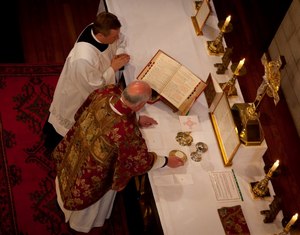 For Catholics it is Sunday, not the Sabbath (Saturday) in the technical sense as it applies to Jewish theology, but it is the day of worship of the One Triune God in the Triumph of death by death itself; it is Sunday which commemorates the Resurrection of Jesus, that is the fulfillment of the Paschal Mystery (life, death, Resurrection and Ascension of the Lord). Sunday is the perpetual Day of the Lord in practice.
For Catholics it is Sunday, not the Sabbath (Saturday) in the technical sense as it applies to Jewish theology, but it is the day of worship of the One Triune God in the Triumph of death by death itself; it is Sunday which commemorates the Resurrection of Jesus, that is the fulfillment of the Paschal Mystery (life, death, Resurrection and Ascension of the Lord). Sunday is the perpetual Day of the Lord in practice.
From the earliest days Christians understood each Sunday as a “Little Easter” and it is celebrated with great seriousness. But Christians never forgot to celebrate, Easter, the Resurrection of the Lord, with great solemnity preceded by a period of preparation we call Lent and the Sacred Triduum. The Lord’s Day is observed, the Mystical Body of Christ hopes, as a day of rest and worship of God that is demanded of us by the Third Commandment. It is THE day of the week on which the making of money and being a slave to work is turned on its head (CCC 2172).
What do holy days teach us? Why does the Church bother insisting on them today? In the spiritual sense holy days are a gift in the same way Sunday is a gift. Recall that the key gift God gave us in the Decalogue is rest, just as He rested. The gift of the Sabbath, and observing the Sabbath, is looking for meaning, knowing with certitude that we are children of God who live in freedom. The Sabbath is THE time to reflect upon Someone and Something greater than we are. We are made for the Infinite, not the finite. If we apply the gift of Sunday, of the Sabbath to the point of observing holy days we will notice that that one’s holy day observance is another way to make real the graces of Easter in ordinary life. As the great French scholar Father Louis Bouyer once wrote, we are “grafted upon Him [Christ] so that the same life which was in Him and which He has come to give us may develop in us as in Him and produce in us the same fruits of sanctity and love that it produced in Him.”
Days of Obligation seek are in a minor key the graces of Sunday to other days of the week in a given time of the year. By making some days obligatory the Church asks the faithful to attend Holy Mass. In the USA the holy days, in addition to Sunday, are:
- January 1, Mary, Mother of God
- August 15, Assumption of Mary
- November 1, All Saints
- December 8, Immaculate Conception of Mary
- December 25, Nativity of the Lord, Christmas.
A slight inconvenience of time is a true sacrifice for people today, more than some people parting with their money for the good works of the Church. Having to arrange your schedule around Mass times can be tough for some but it is worthy exercise of love for God. A sacrifice is a blessing in secret. “My conveniences” are transformed into a self-gift of time given in praise of God, the reception of the sacraments and doing good.
Admittedly, it is a lost cause in the 21st century if we have to appeal to and argument from law to convince people that it’s worthy of them to attend Mass on a holy day such as All Saints. The point of prayer, for example, Mass, is to enter into a beautiful relationship with God. Obliging one to pray seems silly. It does, however, remind those who need reminding that we don’t make ourselves and that in our work of conversion we are brought more and more to realize that we belong to Jesus Christ, that we are in love with our Lord and Savior.